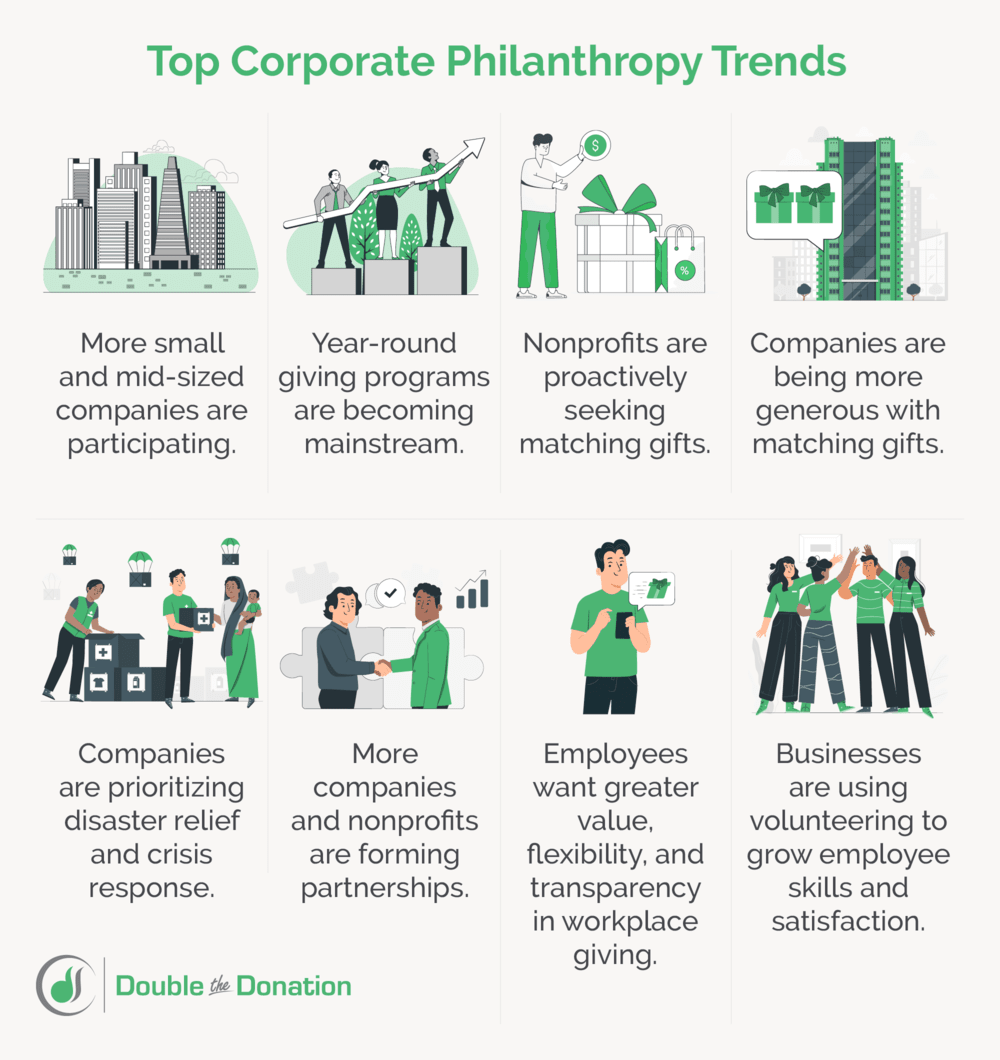Can corporate philanthropy solve education inequality?
Wiki Article
Checking Out How Corporate Philanthropy Shapes Brand Track Record and Client Loyalty
Company philanthropy considerably influences brand track record and customer loyalty. Business that participate in authentic philanthropic campaigns usually see a positive shift in just how customers view them. This alignment of worths fosters trust and psychological links with target markets. The effectiveness of these philanthropic efforts can vary substantially. Recognizing what genuinely reverberates with consumers is important for brands looking for to boost their social impact and market position. What methods will emerge as vital for future success?The Development of Company Philanthropy
As services increasingly identify their function in culture, the development of company philanthropy has actually transformed from simple philanthropic contributions to a critical element of brand identity. Firms involved in philanthropy largely for tax benefits or to boost their public image. Over time, this technique shifted as stakeholders-- including staff members, financiers, and consumers-- demanded an extra genuine commitment to social responsibility.Organizations began aligning their philanthropic initiatives with their core worths and service goals, resulting in even more thoughtful and impactful payments. This adjustment has encouraged companies to purchase lasting methods and community advancement, promoting a sense of objective that reverberates with consumers.
Furthermore, technological developments have actually helped with openness and involvement, enabling businesses to display their humanitarian initiatives much more successfully. Subsequently, corporate philanthropy has actually emerged as an important part of business method, with organizations accepting the opportunity to positively influence society while improving their total brand narrative.
The Influence of Philanthropy on Brand Assumption
While business involve in kind initiatives to promote social great, these initiatives significantly shape brand perception among customers. Corporate philanthropy can enhance a brand's photo by associating it with positive social influence and neighborhood involvement. Consumers frequently regard brand names that proactively take part in philanthropic tasks as more trustworthy and responsible. This assumption can influence investing in decisions, as consumers might favor brands that demonstrate a commitment to social issues.
Building Emotional Links With Granting
Corporate philanthropy offers as a powerful tool for improving brand name identity by linking company values with community needs. With calculated giving, companies can promote neighborhood interaction and develop shared worths that resonate with consumers on an emotional degree. This technique not only reinforces brand name online reputation yet also constructs enduring links in between companies and their stakeholders.Enhancing Brand Name Identification
They not only contribute to societal great yet also build deeper emotional connections with their target markets when business engage in kind initiatives. By aligning their brand name with philanthropic reasons, firms enhance their identity and signal values that resonate with consumers. This placement develops a narrative that surpasses solutions and products, welcoming consumers to take part in a common objective. As consumers increasingly prioritize purpose-driven brands, business that actively participate in offering can differentiate themselves in a crowded market. Such campaigns promote a sense of loyalty amongst clients who really feel directly attached to the brand name's values. Eventually, business philanthropy ends up being a vital tool for improving brand name identity, growing lasting partnerships based on shared ideas and emotional engagement.Fostering Neighborhood Interaction
Many research studies indicate that firms participating in community-focused humanitarian efforts can noticeably strengthen psychological connections with their stakeholders. By buying neighborhood jobs and supporting social causes, companies cultivate a feeling of belonging and count on within the neighborhood. This interaction promotes a favorable brand photo, as customers appreciate business that show real concern for societal problems. Workers usually feel more happy and motivated to be linked with an organization that focuses on area well-being. Consequently, consumers are more probable to establish commitment in the direction of brand names that actively add to meaningful reasons. Ultimately, fostering area engagement via philanthropy not just enhances brand name track record yet also constructs lasting emotional connections that profit both the business and the community it offers.Developing Shared Worths
How can companies properly develop common values that resonate with their stakeholders? Business can attain this by straightening their humanitarian initiatives with their core objective and the interests of their neighborhoods. By engaging in initiatives that attend to neighborhood demands, businesses promote emotional links with consumers, boosting brand name loyalty. Partnering with non-profits that reflect shared worths reinforces the brand name's photo and demonstrates commitment to social responsibility. In addition, transparent interaction regarding these efforts permits stakeholders to see the substantial effect of their payments. Inevitably, by incorporating common worths right into their company philanthropy, companies not only boost their online reputations but likewise cultivate long-term partnerships with clients, resulting in increased loyalty and trust fund. This positioning is important in modern-day customer decision-making.Situation Studies: Successful Philanthropic Campaigns
Checking out successful kind campaigns exposes different methods that enhance brand name reputation. Impactful area initiatives, innovative collaboration models, and long-lasting interaction techniques have actually verified effective in cultivating favorable connections with consumers. These instance research studies highlight the relevance of thoughtful business giving up attaining both social and service purposes.Impactful Community Initiatives
Many business have efficiently leveraged kind campaigns to boost their brand name track record while making a purposeful impact in their communities. For circumstances, a modern technology company released a digital literacy program in underserved areas, supplying training and sources that empowered local citizens. This initiative not only added to area advancement yet additionally positioned the company as a socially responsible leader. A major food company carried out an appetite relief project, partnering with neighborhood nonprofits to disperse dishes to family members in requirement. This initiative reinforced neighborhood ties and cultivated consumer commitment. Through these impactful initiatives, companies have actually demonstrated their commitment to social responsibility, efficiently aligning their brand name worths with the demands of the areas they offer, ultimately improving their total online reputation.Cutting-edge Partnership Models
The success of impactful area campaigns often hinges on innovative partnership designs that combine diverse stakeholders to deal with complicated social difficulties. Instance researches show how firms, non-profits, and federal government entities can collaborate efficiently. A multinational corporation partnered with a local non-profit to release an education and learning program, merging sources and knowledge to enhance neighborhood proficiency rates. Another example included a technology company and a healthcare company joining forces to create a telemedicine option for underserved populations. These collaborations not just amplified the reach of philanthropic efforts however additionally strengthened the brand names' online reputations by aligning their objectives with community needs. Eventually, innovative partnership designs act as a stimulant for meaningful adjustment and foster more powerful links in between brands and their customers.Lasting Involvement Methods

Gauging the ROI of Business Social Obligation
As companies progressively purchase corporate social responsibility (CSR) initiatives, understanding the return on investment (ROI) related to these initiatives comes to be essential. Gauging ROI in CSR is complex, frequently encompassing both measurable and qualitative metrics. Financial returns can be examined with boosted sales, enhanced brand name loyalty, and enhanced staff member morale, which can cause greater productivity. Additionally, firms may evaluate expense savings connected to lasting methods, such as reduced waste or power intake.Qualitatively, the impact of CSR on brand name reputation can be assessed through customer understanding researches and social networks sentiment analysis. Studies can offer understandings right into how CSR activities affect consumer loyalty and depend on. Benchmarking against market standards can aid companies assess their CSR performance - corporate philanthropy. Ultimately, a thorough method to gauging ROI makes it possible for business to make enlightened choices regarding future CSR investments, lining up strategies with both monetary efficiency and social influence
Consumer Assumptions and Company Obligation
Progressively, consumers anticipate business to run with a solid sense of company responsibility, seeing ethical practices as a requirement for brand name commitment. This shift in assumption reflects an expanding awareness of environmental and social concerns, leading clients to prefer brand names that line up with their worths. Customers are a lot more likely to sustain business that participate in transparent methods, demonstrate sustainability, and add favorably to their neighborhoods.Furthermore, social networks intensifies these assumptions, permitting customers to share their experiences and opinions quickly. Brand names that fall short to meet these moral standards run the risk of reaction, while those that embrace company obligation frequently delight in enhanced track record and customer commitment. As consumers require accountability, firms need to integrate business social duty into their core techniques, focusing on ethical habits not simply as a marketing method, but as an essential facet of their procedures. This alignment can eventually cause more powerful brand here affinity and sustained success in open markets.
Future Fads in Company Philanthropy and Brand Loyalty
The landscape of business philanthropy is evolving, influenced by the increased consumer expectations bordering corporate duty. Firms are increasingly integrating social influence into their core organization approaches, not simply as a secondary task. Future fads show a change towards openness, with brand names sharing thorough information about their philanthropic initiatives and their direct results on areas.Furthermore, innovation is playing a crucial role, allowing real-time interaction between brand names and customers. Social network platforms facilitate straight interaction, enabling customers to articulate their assumptions and hold brands answerable. In addition, younger generations, specifically Millennials and Gen Z, focus on sustainability and moral methods, driving companies to take on more conscientious techniques.
As corporate philanthropy ends up being associated with brand name identity, firms that authentically align their missions with social demands are most likely to promote more powerful client commitment. This convergence of worths will eventually shape the future of business credibility and customer connections in an increasingly conscientious industry.
Often Asked Inquiries
How Do Customers Learn about a Firm's Philanthropic Efforts?
Customers discover a firm's philanthropic initiatives via various networks, consisting of social media, news release, community occasions, and word-of-mouth. These avenues assist in recognition, allowing individuals to involve with brand names that line up with their values and interests.What Duty Does Staff Member Participation Play in Company Philanthropy?
Worker participation in business philanthropy enhances involvement, fosters a sense of possession, and enhances group cohesion - corporate philanthropy. This engagement often intensifies the impact of philanthropic campaigns, leading to greater understanding and support for the company's humanitarian initiativesCan Corporate Philanthropy Backfire on a Brand's Track record?
If perceived as insincere or opportunistic, business philanthropy can undoubtedly backfire on a brand's credibility. Unfavorable public perception may arise, resulting in diminished trust fund and loyalty among customers that prioritize credibility in business activities.Are Smaller Business as Efficient in Philanthropy as Larger Firms?
Smaller firms can be similarly effective in philanthropy as bigger corporations, often showing agility and credibility. Their localized efforts may reverberate more deeply with areas, cultivating real connections despite restricted sources compared to their bigger equivalents.How Can Companies Pick the Right Creates to Assistance?
Business can pick the ideal causes by straightening their worths with neighborhood needs, evaluating stakeholder interests, and assessing potential effect. This tactical strategy cultivates credibility, boosts engagement, and reinforces links with customers and the wider neighborhood.While business engage in kind efforts to advertise social great, these efforts considerably shape brand name perception amongst customers. As customers significantly prioritize purpose-driven brand names, firms that proactively engage in offering can separate themselves in a jampacked market. Lots of business have efficiently leveraged humanitarian campaigns to boost their brand credibility while making a meaningful effect in their communities. Significantly, customers expect companies to run with a strong feeling of business responsibility, seeing honest techniques as a requirement for brand name loyalty. As business philanthropy comes to be associated with brand identity, firms that authentically straighten their goals with societal demands are likely to cultivate stronger consumer commitment.
Report this wiki page